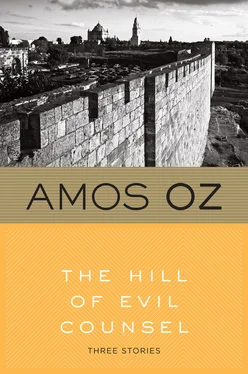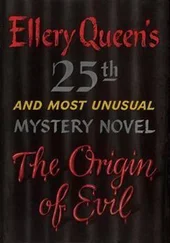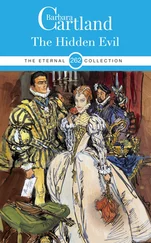Then, in the dark, they leaned over him from either side of the deep armchair, stroked his curly hair and his cheeks with honeyed fingers, felt his chest through his cotton shirt, and carried him off to bed in their arms. His nostrils suddenly caught a strange smell. His eyes were shut tight with tiredness, but some sudden stimulus, a throb of sly curiosity, made him open them just a crack. The light was poor. The air in the room was full of smoke and sweat and eau de cologne. He caught a strange, heart-pinching glimpse of the waistband of Binyamina's knickers through the opening in the front of her dressing gown. And a faint sucking sound behind the bed. A moist whisper. Russian. A vague, unfamiliar feeling thrust its way up and down his spine. Not knowing what it was, he lay motionless on his back and glimpsed a shoulder, a hip, unknown curves, and his heart pounded and pounded like a frightened rabbit's.
He went on breathing deeply, calmly, as if he were fast asleep. Now even he was shocked at his slyness. Sleep had deserted him completely. He could feel the blood throbbing in his ankles. He smelled a blend of strong smells, and he knew that a large woman was blowing on his cheek to see if he was asleep. The sheet rustled. Fear and excitement clashed in his breast, and he decided to go on pretending to be a little boy fast asleep. He suddenly remembered the gleam in Uncle Mitya's eye as he spoke about she-goats. He also remembered the words "Perfidious Albion," but he could not remember what they meant. Hands were pulling at his gym shorts. His organ, which was taut like a thin pencil, was being touched with something like warm, sticky jam. He gritted his teeth, and forced himself with all his might not to recoil, not to stop his rhythmic breathing. Asleep. Feeling nothing. Not here. Far away. Only don't let it stop now the feel of velvet she-goats silk jam pink transparent more more. And the naughty Oriental girls who knocked him down on piles of gravel and pulled and pulled his hair and one of them was beginning to grow breasts under her vest. Mommy. A wet, licking feeling up his spine. And pinching. Then the slender pencil began to sneeze convulsively between the fingers of the musical women. The boy stifled a moan. Madame Yabrova let out a low, fleshy laugh. And Lyubov Binyamina suddenly panted like a thirsty dog.
The lamp on the piano went out. The room was dark and still. He opened his eyes and saw nothing but darkness. There was not a sound to be heard. Nothing stirred. In that moment Hillel knew that Daddy and Mommy would never come back and girls would never fight with him again on the gravel heap and there would be no more Mitya or anyone, they had all gone away and would never return. He was alone in the house alone in the neighborhood there was no one in Tel Arza no one in Jerusalem no one in the whole country he was left all alone with the jackals and the woods and the nibbled skeleton of the Turkish janissary.
12
The guest of honor at the ball was the Hero of Malta, Admiral Sir Kenneth Horace Sutherland, V.C., K.B.E., Deputy First Sea Lord.
He was standing, tall, pink-faced, and broad-shouldered, on the edge of the illuminated fountain, resplendent in his spotless white uniform and gleaming medals. He was holding a cocktail in his right hand, while in his left he twirled a single magnificent rose. He was surrounded by officers and gentlemen, by red-fezzed Arab dignitaries with gold watch chains strung across their bellies, and by wistful, sparkling-eyed English ladies, while tall, pitch-black Sudanese servants moved everywhere brandishing silver salvers, with snow-white napkins draped over their hooked arms.
Admiral Sutherland was telling a slightly risqué story, in a dry delivery spiced with naval slang, about the American general George Patton, a performing monkey, and a hot-blooded Italian actress by the name of Silvana Lungo. When he got to the punch line, the men guffawed and the ladies let out shocked shrieks.
Colored lights shone under the water in the marble pool, more lights hung suspended in the air, paper lanterns glowed among the trees, and the light breeze ruffled the pines. The gently sloping lawns were dotted with rose beds and divided by impeccably kept gravel paths. The palace itself floated on the beams of concealed floodlights. Its arches of Jerusalem stone were delicately, almost tenderly, carved.
At the foot of the veranda clustered some prominent figures of the Jewish community, including many of the leading lights of the Jewish Agency, the two elderly bankers Shealtiel and Toledano, Mr. Rokeah, the mayor of Tel Aviv, and Mr. Agronski of the Palestine Post. They were gathered in an excited semicircle around Captain Archibald Chichester-Browne, the British government spokesman, with whom they were engaged in a good-natured altercation. But for once the captain was disinclined to be serious. He pronounced one or two uncharitable remarks about the Arab League, which the prominent Jews interpreted as a favorable sign. Moshe Shertok dropped a hint to the others that they should be satisfied with this achievement and change the subject immediately, so as not to overstep the mark.
And so the conversation turned to the potash works that were rapidly being developed beside the Dead Sea. Captain Chichester-Browne took the opportunity to compare the Jewish kibbutzim to the early Christian communities that had once existed in the same region, and while on the subject, he even saw fit to praise Professor Klausner's work on the origins of Christianity. His audience drew further encouragement from these remarks, and mentally noted with glee that he had voiced two favorable sentiments in rapid succession. The captain then took his leave of the Zionist gentlemen with a charming, carefully modulated smile; he gestured ironically with his chin toward a group of Arab dignitaries from Bethlehem, winked at Moshe Shertok, and remarked confidentially that the other gentlemen were also demanding their pound of flesh. With that, he turned on his heel and walked over to join them.
After advancing slowly in a procession with other guests, Dr. and Mrs. Kipnis were eventually presented to the Military Governor of Jerusalem, to Lady Cunningham, and finally to Sir Alan himself.
Old Lady Bromley was nowhere to be seen. Perhaps she had fainted again. Sir Alan and Lady Cunningham greeted Father: "Pleased to meet you," "So glad you could come." Sir Alan allowed his grave blue glance to rest searchingly for a moment on Mother's black eyes as he said, "If I may say so, dear lady, your beauty and that of Jerusalem were molded by the same divine inspiration. I dare to hope that you will not be bored by our modest entertainment."
Mother responded to the compliment with one of her beautiful autumnal smiles. It hovered on her lips, as fine and transparent as the tears of the slain cavalrymen in the Polish poem.
Then a steward showed them to the bar and handed them over to an Armenian barman. Father immediately opted for a tomato juice, while Mother, after a moment's hesitation, the smile still playing faintly around her lips, asked for a glass of cherry brandy. They were conducted to a pretty wicker table and seated between Mr. Tsipkin, the Citrus King, and Madame Josette al-Bishari, the headmistress of the Arab National High School for Girls. They exchanged polite remarks.
Presently, the Military Governor of Jerusalem delivered a short, witty address from the veranda of the palace. He began with a reference to the crushing defeat inflicted on the enemies of humanity by Great Britain and her allies in May of the previous year. He paid a tribute to the guest of honor, Admiral Sir Kenneth Horace Sutherland, the Hero of Malta, and declared that the world had not yet seen the German, Italian, or lady who could resist him. He also paid tribute to the holy character of Jerusalem. He delivered an impassioned plea for fellowship and understanding among the adherents of the various religions. He added jokingly that if love did suddenly spring up among the different religious groups, the first thing the lovers would do would be to kick out the British. It was well known, he said, that in a love affair there was no place for a third party. But we British had always believed in miracles, and the idea of a Trinity was not entirely unfamiliar to Jerusalem; so whatever happened we would continue to haunt Palestine in the role of Holy Spirit, for which, of course, we were uniquely suited. A toast to the Crown. A toast to the Hero of Malta. Another toast to Sir Alan and his charming lady. And, if they would kindly refill their glasses, a final toast to the spring and to amity among all the inhabitants of the Holy Land, Moslems, Christians, Jews, and Socialists.
Читать дальше











